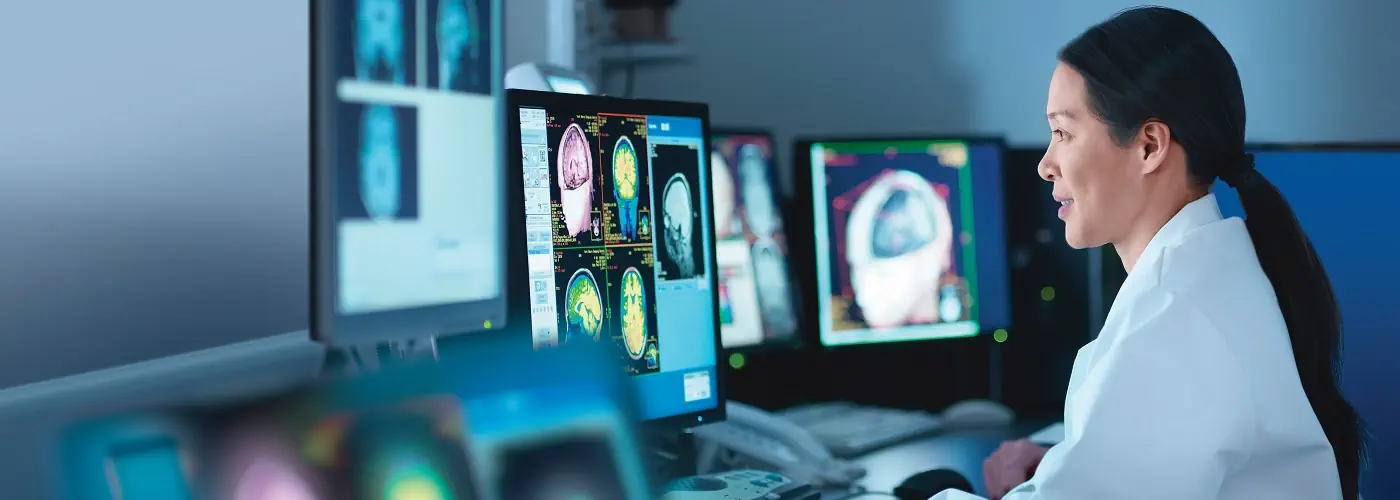
Radiology is a specialist branch of medicine that deals with the scanning of body images. The core function of this specialist department is to provide doctors and patients with high quality medical diagnostic imaging in a safe and friendly manner
Gleneagles Hospitals boast ultramodern radiological and imaging equipment with state-of-the-art technology and is managed by a dedicated team of specialist radiologists and technologists helmed by a highly qualified experienced senior radiological consultant.
For concerned mothers, we also provide non-invasive tests detecting major chromosomal issues via maternal blood evaluation – prenatal screening with biochemical markers and risk evaluation.
Gleneagles Hospitals offers the following perinatal radiological screening services:
- Perinatal screening – 11+6 to 13+6 weeks (NTT+biochemistry)
- Dating scan – 11-13 weeks
- Foetal anomaly scan – 20-24 weeks
- Prevention and detection of preterm labour – cervical length measurement and fibronectin test
- Foetal echocardiography
- Foetal surveillance of high risk cases – diabetes, high blood pressure, growth retarded babies, twin pregnancies
- 3D and 4D scans
With a currently virtually paperless and filmless department, Gleneagles Hospitals radiological specialists use the current RIS (Radiology Information System) and PACS (Picture Archiving Communication System). Once the investigation has concluded, images arrive at both radiologist and physician computers for interpretation. This allows Gleneagles Hospitals to save time in the management of a patient's condition. Each report and image interpretation is made available digitally at all times, reducing the chance of losing a film or report or mixing up results. Each subsequent investigation can be compared with previous ones at the click of a button.
The latest in Magnetic Resonance Imaging technology has helped Gleneagles Hospitals provide investigations of the brain, spine and joints as accurate as possible. The MRI is also capable of conducting studies of the liver, biliary tree (MRCPs) as well as pelvic organs.
Current recent developments and progress in MRI technology has pushed its capabilities of imaging breasts via a special breast coil specially created for cases that pose diagnostic difficulty. This has also progressed to scans of the arteries and veins of the brain, body, abdomen and other extremities.
Gleneagles Hospitals recently upgraded our CT Scan diagnostic technology to ones with multi-slice and multi-formatted 3D imagery, providing an increase in our diagnostic capabilities. In a matter of seconds, studies can be completed and the machine itself also allows our department to evaluate issues such as coronary arteries for non-invasive treatments via calcium scoring estimation. Day by day, more patients and our specialists show a preference for this non-invasive method.
In biopsies with CT guidance and routine drainage procedures, our machine is supported by the latest pressure injector for contrasting medium injections. Each 3D image created provides excellent help with evaluation of issues such as fractures, tumors as well as aneurysms.
When it comes to issues such as pulmonary embolisms, abdominal arteries and extremities including neck and brain vessels, our CT angiogram helps provide guided drainage procedures, reducing the need for further invasive surgeries.This non-invasive diagnostic imaging technique helps diagnose and evaluate the various conditions below:
- Congenital heart defects
- Heart valve problems
- Coronary artery blockage and heart attacks
- Congestive heart failure
- Pericardial sac disease
- Heart tumors
Built upon the foundations of the MRI, the Cardiac MRI is optimised for the cardiovascular system so key functions and morphological features are made easier to be assessed. Such optimisations principaly make us of ECG gating and rapid imaging techniques or sequences. Some of the benefits of the Cardiac MRI include:
- No ionising radiation is used
- Can perform infarct imaging using contrast media study
- MRA (magnetic resonance angiography) can produce 3D and 4D images of blood vessels and the flow of blood through the vessels
- With our 3 Tesla MRI, we produce better resolution imaging in a shorter space of time


Wait a minute